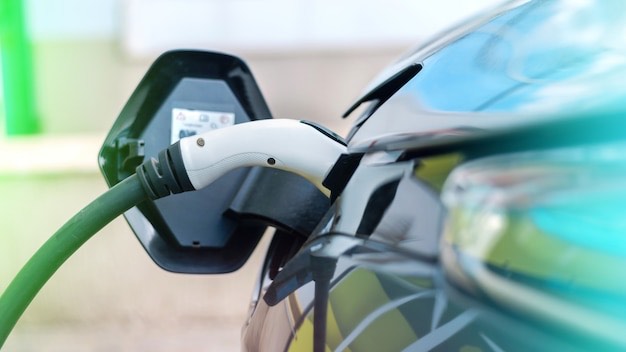Blog > “Power Up Your Property: Is a Home EV Charger the Secret to Boosting Your Home’s Value?”
“Power Up Your Property: Is a Home EV Charger the Secret to Boosting Your Home’s Value?”
by

With electric vehicles (EVs) on the rise, more homeowners are considering adding a home EV charger as part of their property’s appeal. But does installing an EV charger truly add value to your home? Let’s take a closer look at the pros, cons, costs, and installation details for home EV chargers to help you decide if it’s the right move for your property.
The Growing Appeal of Home EV Chargers
EVs are quickly becoming a fixture on the road as more people make the switch to reduce their carbon footprint and save on fuel. With this shift, the convenience of a home EV charger is growing in popularity. A charger lets you skip public charging stations, save time, and ensures your vehicle is ready to go each morning. But for those thinking of resale value, the big question remains: does a home EV charger increase your home’s worth?
Does a Home EV Charger Add Value?
The answer: it depends. In markets with a high rate of EV adoption, such as urban and suburban areas with environmentally conscious buyers, a home EV charger can be a selling point. Buyers with EVs—or those planning to buy one—see an installed charger as a convenience they won’t need to add themselves, potentially making your home stand out. In fact, some reports suggest homes with EV chargers can sell faster and appeal to a growing segment of buyers who prioritize eco-friendly upgrades.
However, if you’re in an area where EVs aren’t yet mainstream, the perceived value of a charger may be limited. For those in EV-friendly areas, though, a home EV charger could help your home sell more quickly and possibly at a premium.
Types of Home EV Chargers and Installation Details
There are three types of EV chargers, each offering different charging speeds, costs, and installation considerations:
1. Level 1 Chargers
• Description: The most basic option, these chargers plug into a standard 120-volt outlet and add about 3-5 miles of range per hour of charging.
• Installation: Simple plug-and-play setup.
• Cost: Typically included with most EVs, so there’s no additional cost for the charger itself.
• Ideal For: Occasional drivers or those who don’t need a full charge each day.
2. Level 2 Chargers
• Description: The most popular option for home use, these chargers use a 240-volt outlet and can add 20-60 miles of range per hour, depending on the model.
• Installation: Requires a dedicated 240-volt circuit, so you may need an electrician to install it.
• Cost: The charger itself ranges from $400 to $700, with installation costs from $200 to $800 depending on electrical work.
• Ideal For: Daily commuters and those who want a full charge overnight.
3. DC Fast Chargers
• Description: These powerful chargers add up to 100 miles in just 30 minutes but are rarely installed at homes due to high costs and energy demands.
• Installation: Requires significant electrical work, potentially involving panel upgrades.
• Cost: Chargers and installation can run from $10,000 to $50,000.
• Ideal For: Commercial settings or multi-family dwellings.
Pros of Installing a Home EV Charger
• Convenience: Charging your car overnight at home saves time compared to public charging stations.
• Appeal to Future Buyers: In areas with many EV owners, a home charger could be a big selling point.
• Potential Resale Value: Although more research is needed, early studies show homes with chargers may sell faster.
• Energy Efficiency: A Level 2 charger, for example, is faster and more efficient than public stations.
Cons of Installing a Home EV Charger
• Installation Costs: Adding a Level 2 charger can cost several hundred dollars for equipment and installation, especially if electrical work is needed.
• Limited Market Appeal: If your area has few EV owners, the charger may not add much value.
• Electricity Bill Increase: Charging at home will increase your electricity bill, although this is typically lower than the cost of gasoline.
Cost Efficiency on Electric Bills
Charging at home does add to your monthly electric bill, but it’s usually more affordable than paying for gas. Most EV owners find that charging overnight at off-peak hours can reduce electricity costs further, and many utility providers offer EV-specific rate plans for even more savings. The average EV owner can expect to spend about $30-$50 a month on home charging, depending on local electricity rates and driving habits.
Is a Home EV Charger Right for You?
If you own an EV and plan to stay in your home for several years, a Level 2 charger can be a worthy investment for convenience alone. For those in high-EV areas, a charger may make your home more attractive to future buyers and potentially boost resale value.
For sellers, installing a charger may add a “wow” factor in the right markets. However, if you’re not in a place with significant EV adoption, it’s worth weighing whether the cost of installation will yield a meaningful return.
The Bottom Line
A home EV charger can be a worthwhile investment in convenience, and in some cases, a selling point. If your area has a high EV adoption rate, it’s likely to attract more potential buyers who’ll appreciate a ready-to-use charging station. For personal use, the convenience of charging at home—and the cost savings on gasoline—can make the installation worthwhile.
Whether you’re buying or selling, adding a home EV charger is one way to future-proof your home and align with the growing shift toward electric vehicles.

#atlantarealtor #relocatetoatlanta #georgiamove #movetogeorgia #HomeEVCharger #ElectricVehicleCharger #Level2Charger #EVChargerInstallation #HomeValueUpgrade #ElectricVehicleHomeCharging #DoesEVChargerAddHomeValue #EVChargerProsAndCons #CostOfHomeEVCharging #HomeUpgradesForEVs #Level2ChargerBenefits #InstallEVChargerAtHome
